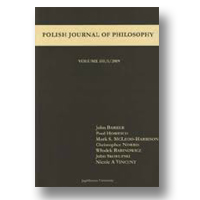|
articles |
|
1.
|
Polish Journal of Philosophy:
Volume >
9 >
Issue: 1
Arkadiusz Gut
Overcoming Logical Psychologism (Frege’s Influence on Husserl)
abstract |
view |
rights & permissions
| cited by
The central and probably most controversial point concerning the psychologism — anti-psychologism debate is the problem of Frege’s alleged influence on the change in Husserl’s views. Contemporary thinkers investigating the early period of Husserl’s philosophy (between 1891—1895) have attempted to show that the opinion that Frege’s doctrine had a traumatic influence on Husserl’s views is not justified. This paper, which tries to maintain a balance between strictly philosophical argumentation and narrowly understood historical argumentation, suggests an alternative solution. By appealing to Frege’s works (known by Husserl) published before 1894, the locus of psychologism will be determined. Afterwards, I will present Husserl’s and Frege’s views on the elucidation procedure and the distinction between calculus and ‘lingua characteristica’. By discussing Husserl’s works from 1894-1897, I will show that his standpoint changed dramatically as he entered into the anti-psychological program, involving a new theory of concepts, judgment, and the so-called ‘pure Fregean flavour’ — a new account of logical content.
|
|
|
|
|
2.
|
Polish Journal of Philosophy:
Volume >
9 >
Issue: 1
Stephen K. McLeod
Two Philosophies of Need
abstract |
view |
rights & permissions
| cited by
Instrumentalists about need believe that all needs are instrumental, i.e., ontologically dependent upon ends, goals, or purposes. Absolutists view some needs as non-instrumental. The aims of this article are: clearly to characterize the instrumentalism/absolutism debate that is of concern (mainly §1); to establish that both positions have recent and current adherents (mainly §1); to bring what is, in comparison with prior literature, a relatively high level of precision to the debate, employing some hitherto neglected, but important, insights (passim); to show, on grounds not previously to the fore in the literature, that insofar as instrumentalism’s advocates have provided arguments for the position, these are unsound (§2); to argue against instrumentalism using a new dilemma concerning whether ‘end’, ‘goal’, and ‘purpose’ are interpreted in a mentalistic manner (§3); to elucidate the implications of the needs/need-satisfiers and preconditions/means distinctions for the debate (§4).
|
|
|
|
|
3.
|
Polish Journal of Philosophy:
Volume >
9 >
Issue: 1
John Shand
Free Will and Subject
abstract |
view |
rights & permissions
| cited by
Traditionally formulated, the problem of free will cannot be solved. We may nevertheless be justifiably confident that we have free will. The traditional formulation makes a solution impossible by juxtaposing contradictory objective and subjective accounts of whether there is free will, between which accounts there is no third way to choose. However, the objective stance inherently denies the conditions under which free will is possible, namely that there are subjects, and is thus question-begging. It gives us no good reason for our not having free will without our also accepting that there are no subjects. As subjects we may not deny that there are subjects, and that as subjects we have good reason, through our experience of free will, to hold that we have free will. The problem of free will is a footnote to how there may be subjects. In order to understand what free will is we need to look at how it is experienced, that is, at the phenomenology of free will.
|
|
|
|
|
4.
|
Polish Journal of Philosophy:
Volume >
9 >
Issue: 1
Gianfranco Soldati
Methodological Problems in the Phenomenology of Time
abstract |
view |
rights & permissions
| cited by
It is difficult to develop a coherent conception of time on the basis of our experience of time. The philosophical analysis of our experience of time is a central topic in phenomenology. So one might expect phenomenology to deliver a contribution to the solution of the most challenging puzzles of the philosophy of time. This paper deals with some methodological issues related to such an expectation. It opposes two main conceptions of the role of phenomenology in the philosophy of time. On the first conception phenomenology draws conclusions about the nature of time from the description of the qualitative features of our experience of time. On the second conception, phenomenology determines what we are rationally entitled to believe about the nature of time on the basis of the way we experience time. It is argued that if one aims at integrating different approaches in one’s philosophical conception of time, then it is the second conception one ought to choose.
|
|
|
|
|
critical discussion |
|
5.
|
Polish Journal of Philosophy:
Volume >
9 >
Issue: 1
Mats Volberg
Implications of Paternalism and Buck-passing: A Reply to Quong
abstract |
view |
rights & permissions
| cited by
In his latest book, Liberalism without Perfection (2011), Jonathan Quong argues against liberal perfectionism and defends Rawlsian political liberalism. In the course of his argumentation he presents us with a judgmental account of paternalism and the buck-passing account of truth in political philosophy. The aim of this paper is to critique both of those elements in Quong’s argumentation. I will first present the judgmental account of paternalism and then demonstrate that it will place impossible demands on us, insofar as paternalism is a prima facie wrong and we have a duty to reduce wrongness in the world. I will then turn to the buck-passing account of truth; after introducing it, I show that it will generate uncertain results for political philosophy, making it an unsatisfactory solution for the political liberal making truth claims in political philosophy.
|
|
|
|
|
book reviews |
|
6.
|
Polish Journal of Philosophy:
Volume >
9 >
Issue: 1
Nina Atanasova, Lisa A. Korf, Daniel J. Vecchio
Book Reviews
view |
rights & permissions
| cited by
|
|
|
|
